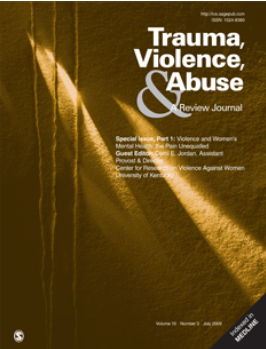童年的不良经历对一生中认知控制能力的影响:前瞻性研究的系统回顾和元分析
IF 5.4
1区 社会学
Q1 CRIMINOLOGY & PENOLOGY
引用次数: 0
摘要
童年不良经历(ACE)与认知控制能力受损密切相关,但有关ACE对认知控制领域--工作记忆、认知灵活性和抑制控制--的影响的研究仍然很少。本系统综述和荟萃分析评估了 ACE 对这些认知控制领域的总体影响,并探讨了年龄、性别、认知控制范式以及基于逆境和心理病理学维度模型的 ACE 亚型等调节因素。我们在 SCOPUS、MedLine、PsycINFO 和 Web of Science 中进行了数据库检索。为确保时序推断,只纳入了前瞻性研究,这些研究至少有两个数据收集点,分别评估基线(T1)时的逆境教育和随访(T2)期间的认知控制。分析了 32 项研究(N = 26,863 )产生的 124 个效应大小。三级荟萃分析表明,ACE 与总体认知控制(g = -0.32)以及工作记忆(g = -0.28)、认知灵活性(g = -0.28)和抑制控制(g = -0.32)等各领域之间存在小到中等程度的负相关。在不同年龄、性别和认知控制范式中,ACE 与认知控制之间的负相关是一致的。ACE亚型调节了认知灵活性(p = .04),但没有调节工作记忆或抑制控制。具体来说,与威胁亚型和威胁与剥夺亚型相比,剥夺亚型与认知灵活性的负相关更强。这些发现凸显了 ACE 对各年龄段认知控制能力的普遍负面影响,并强调了有针对性干预的必要性。本文讨论了研究的意义、目前的差距、局限性以及未来的研究建议。本文章由计算机程序翻译,如有差异,请以英文原文为准。
The Impact of Adverse Childhood Experiences on Cognitive Control Across the Lifespan: A Systematic Review and Meta-analysis of Prospective Studies
Adverse childhood experiences (ACEs) are strongly associated with impaired cognitive control, yet research on ACEs’ effects across cognitive control domains—working memory, cognitive flexibility, and inhibitory control—remains sparse. This systematic review and meta-analysis evaluated the overall impact of ACEs on each of these cognitive control domains and explored moderating factors such as age, gender, cognitive control paradigms, and ACEs subtypes based on the dimensional model of adversity and psychopathology. A database search was conducted in SCOPUS, MedLine, PsycINFO, and Web of Science. Only prospective studies were included to ensure temporal order inferences, with at least two data collection points, assessing ACEs at baseline (T1) and cognitive control during follow-up (T2). Thirty-two studies ( N = 26,863) producing 124 effect sizes were analyzed. Three-level meta-analyses revealed small-to-medium negative associations between ACEs and overall cognitive control ( g = −0.32), and in each domain: working memory ( g = −0.28), cognitive flexibility ( g = −0.28), and inhibitory control ( g = −0.32). The negative associations between ACEs and cognitive control were consistent across age, gender, and cognitive control paradigms. ACEs subtypes moderated the association with cognitive flexibility ( p = .04) but not working memory or inhibitory control. Specifically, the deprivation subtype exhibited a stronger negative association with cognitive flexibility compared to threat and threat-and-deprivation subtypes. These findings highlight the pervasive negative impact of ACEs on cognitive control across ages and emphasize the need for targeted interventions. Implications, current gaps, limitations in research, and future study recommendations are discussed.
求助全文
通过发布文献求助,成功后即可免费获取论文全文。
去求助
来源期刊

Trauma Violence & Abuse
Multiple-
CiteScore
13.60
自引率
7.80%
发文量
131
期刊介绍:
Trauma, Violence, & Abuse is devoted to organizing, synthesizing, and expanding knowledge on all force of trauma, abuse, and violence. This peer-reviewed journal is practitioner oriented and will publish only reviews of research, conceptual or theoretical articles, and law review articles. Trauma, Violence, & Abuse is dedicated to professionals and advanced students in clinical training who work with any form of trauma, abuse, and violence. It is intended to compile knowledge that clearly affects practice, policy, and research.
 求助内容:
求助内容: 应助结果提醒方式:
应助结果提醒方式:


